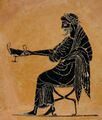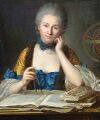Template:Selected anniversaries/December 17: Difference between revisions
No edit summary |
No edit summary |
||
| Line 1: | Line 1: | ||
<gallery> | <gallery> | ||
File:Dionysos kantharos.jpg|link=Dionysus (nonfiction)|500 BC: [[Dionysus (nonfiction)|Dionysus]] gives speech which anticipates the coming of [[Saturnalia (nonfiction)|Saturnalia]]. | File:Dionysos kantharos.jpg|link=Dionysus (nonfiction)|500 BC: [[Dionysus (nonfiction)|Dionysus]] gives speech which anticipates the coming of [[Saturnalia (nonfiction)|Saturnalia]]. | ||
File:Saturnus.jpg|link=Saturnalia (nonfiction)|497 BC: The first [[Saturnalia (nonfiction)|Saturnalia festival]] celebrated in ancient Rome. | File:Saturnus.jpg|link=Saturnalia (nonfiction)|497 BC: The first [[Saturnalia (nonfiction)|Saturnalia festival]] celebrated in ancient Rome. | ||
File:Abd al-Rahman al-Sufi.jpg|link=Abd al-Rahman al-Sufi (nonfiction)|951: Astronomer [[Abd al-Rahman al-Sufi (nonfiction)|Abd al-Rahman al-Sufi]] invents new form of [[scrying engine]]. | |||
|File:Abd al-Rahman al-Sufi.jpg|link=Abd al-Rahman al-Sufi (nonfiction)|951: Astronomer [[Abd al-Rahman al-Sufi (nonfiction)|Abd al-Rahman al-Sufi]] invents new form of [[scrying engine]]. | |||
File:Emilie Chatelet portrait by Latour.jpg|link=Émilie du Châtelet (nonfiction)|1706: Mathematician and physicist [[Émilie du Châtelet (nonfiction)|Émilie du Châtelet]] born. She will translate and comment upon on Isaac Newton's ''Principia Mathematica''. | File:Emilie Chatelet portrait by Latour.jpg|link=Émilie du Châtelet (nonfiction)|1706: Mathematician and physicist [[Émilie du Châtelet (nonfiction)|Émilie du Châtelet]] born. She will translate and comment upon on Isaac Newton's ''Principia Mathematica''. | ||
||1778 – Humphry Davy, English chemist and physicist (d. 1829) | |||
||1790 – Discovery of the Aztec calendar stone. | |||
||1797 – Joseph Henry, American physicist and engineer (d. 1878) | |||
||1833 – Kaspar Hauser, German feral child (b. 1812) | |||
||1842 – Sophus Lie, Norwegian mathematician and academic (d. 1899) | |||
File:John Venn computing diagram.jpg|link=John Venn (nonfiction)|1855: Set theorist and crime-fighter [[John Venn]] devotes himself to fighting [[crimes against mathematical constants]]. | File:John Venn computing diagram.jpg|link=John Venn (nonfiction)|1855: Set theorist and crime-fighter [[John Venn]] devotes himself to fighting [[crimes against mathematical constants]]. | ||
||1862 – American Civil War: General Ulysses S. Grant issues General Order No. 11, expelling Jews from parts of Tennessee, Mississippi, and Kentucky. | |||
||1896 – Pittsburgh, Pennsylvania's Schenley Park Casino, which was the first multi-purpose arena with the technology to create an artificial ice surface in North America, is destroyed in a fire. | |||
File:Dame Mary Lucy Cartwright.jpg|link=Mary Cartwright (nonfiction)|1900: Mathematician and academic [[Mary Cartwright (nonfiction)|Mary Cartwright]] born. She will do pioneering work in what will later be called [[Chaos theory (nonfiction)|chaos theory]]. | File:Dame Mary Lucy Cartwright.jpg|link=Mary Cartwright (nonfiction)|1900: Mathematician and academic [[Mary Cartwright (nonfiction)|Mary Cartwright]] born. She will do pioneering work in what will later be called [[Chaos theory (nonfiction)|chaos theory]]. | ||
||1903 – The Wright brothers make the first controlled powered, heavier-than-air flight in the Wright Flyer at Kitty Hawk, North Carolina. | |||
File:Lord Kelvin by Hubert von Herkomer.jpg|link=William Thomson, 1st Baron Kelvin (nonfiction)|1907: [[William Thomson, 1st Baron Kelvin (nonfiction)|Lord Kelvin]] dies. He did much to unify the emerging discipline of physics in its modern form. | File:Lord Kelvin by Hubert von Herkomer.jpg|link=William Thomson, 1st Baron Kelvin (nonfiction)|1907: [[William Thomson, 1st Baron Kelvin (nonfiction)|Lord Kelvin]] dies. He did much to unify the emerging discipline of physics in its modern form. | ||
||1908 – Willard Libby, American chemist and academic, Nobel Prize laureate (d. 1980) | |||
||1920 – Kenneth E. Iverson, Canadian computer scientist, developed the APL programming language (d. 2004) | |||
File:Otto Hahn 1970.jpg|link=Otto Hahn (nonfiction)|1938: Physicist [[Otto Hahn (nonfiction)|Otto Hahn]] discovers the nuclear fission of the heavy element uranium, the scientific and technological basis of nuclear energy. | |||
||1940 – Alicia Boole Stott, Anglo-Irish mathematician and academic (b. 1860) | |||
||1957 – The United States successfully launches the first Atlas intercontinental ballistic missile at Cape Canaveral, Florida. | |||
||1961 – Niterói circus fire: Fire breaks out during a performance by the Gran Circus Norte-Americano in the city of Niterói, Rio de Janeiro, Brazil, killing more than 500. | |||
||1964 – Victor Francis Hess, Austrian-American physicist and academic, Nobel Prize laureate (b. 1883) | |||
||1969 – Project Blue Book: The United States Air Force closes its study of UFOs. | |||
File:Cherenkov high-energy literature test reactor.jpg|link=High-energy literature|1977: [[High-energy literature]] used during [[Saturnalia (nonfiction)|Saturnalia]] for the first time. | |||
||2003 – SpaceShipOne, piloted by Brian Binnie, makes its first powered and first supersonic flight. | |||
|File:HAL9000.svg|link=HAL 9000|2004: [[HAL 9000]] blames "inherent perversity of [[Saturnalia (nonfiction)|Saturnalia]]" for death of crew and passengers. | |||
||2014 – Dieter Grau, German-American scientist and engineer (b. 1913) | |||
||2015 – Osamu Hayaishi, American-Japanese biochemist and academic (b. 1920) | |||
</gallery> | |||
Revision as of 12:47, 22 October 2017
500 BC: Dionysus gives speech which anticipates the coming of Saturnalia.
497 BC: The first Saturnalia festival celebrated in ancient Rome.
1706: Mathematician and physicist Émilie du Châtelet born. She will translate and comment upon on Isaac Newton's Principia Mathematica.
1855: Set theorist and crime-fighter John Venn devotes himself to fighting crimes against mathematical constants.
1900: Mathematician and academic Mary Cartwright born. She will do pioneering work in what will later be called chaos theory.
1907: Lord Kelvin dies. He did much to unify the emerging discipline of physics in its modern form.
1938: Physicist Otto Hahn discovers the nuclear fission of the heavy element uranium, the scientific and technological basis of nuclear energy.
1977: High-energy literature used during Saturnalia for the first time.







